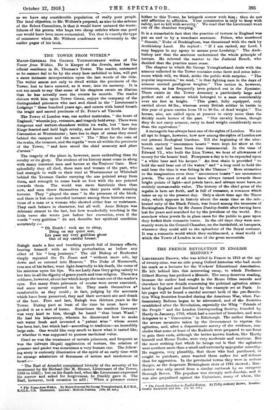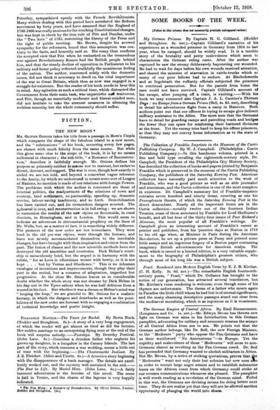THE FRENCH REVOLUTION IN ENGLISH HISTORY.*
LIEUTENANT BROWN, who was killed in France in 1916 at the age of twenty-nine, was an able young Oxford historian who had made his mark as a lecturer for the Workers' Educational Association. He left behind him this interesting essay, to which Professor Gilbert Murray has prefixed a Memoir. The essay deserves reading, because the author had sought in the Home Office reoords and elsewhere for new details concerning the political agitation stimu- lated in England and Scotland by the example set at Paris. In his pages will be found a careful account both of the pre-Revolu- tion Whig Societies founded during the American War, when Par- liamentary Reform began to be advocated, and of the Societies established after the Revolution, especially the Whig "Friends of the People" and the London Corresponding Society, founded by Hardy in January, 1792, which had a number of branches, and sent delegates to a " Convention" in Edinburgh. The author describes the severe measures taken by the Government to repress the agitation, and, after a dispassionate survey of the evidence, con- cludes that some at least of the Radicals were prepared to use force to gain their ends, although the better-known leaders, like Hardy himself and Home Tooke, were very moderate and cautious. But the most striking fact which he brings out is that the agitators were nowhere more than a small and extremely unpopular minority. He suggests, very plausibly, that those who had purchased, or sought to purchase, arms wanted them rather for self-defence than for aggression. In the provincial towns they were in serious danger, as the desperate Birmingham riots of 1791 showed ; Man- chester was only saved from a similar outbreak by an energetic Borough Reeve. The populace was strongly anti-Jacobin, and it was also prejudiced against the Unitarians, many of whom, like
• The French Revolviion in Rnglish Mislay. BY FlitIlp Anthony Brilifo, London : Crosby Lockwood and Son. rs. 6d. Raj
Priestley, sympathized openly with the French Revoltitionists. Many writers dealing with this period have antedated the Reform movement by forty years, and have assumed that the England of 1790-1800 was really anxious for far-reaching Constitutional changes, but was kept in check by the iron rule of Pitt and Dundas, under the "Two Acts" of 1795, restricting the liberty of the Press and the right of public meeting. Mr. Brown, despite his avowed sympathy for the reformers, found that this assumption was con- trary to the facts, and honestly said so. His essay thus confirms the accepted view that Pitt when he embarked on the tremendous war against Revolutionary France had the British people behind him, and that the steady decline of opposition in Parliament to his military and home policy reflected truthfully the unanimous feeling of the nation. The author, concerned solely with the domestic issues, did not think it necessary to dwell on the vital importance of the war to Great Britain, which then as now was engaged in a struggle for existence. But the reader of his book needs to bear this in mind. Any agitation at such a critical time, which distracted the Covemment from their main task, was unpatriotic au( traitorous, and Pitt, though an essentially moderate and liberal-minded man, did not hesitate to take the sternest measures in silencing the reckless minority lest the whole community should suffer.



































 Previous page
Previous page